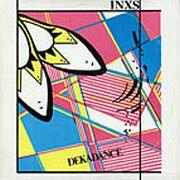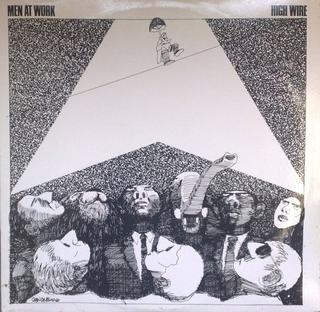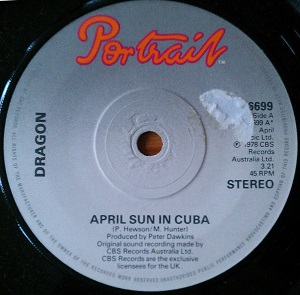Related Research Articles

Dekadance is the title of two different collections of remixes by Australian rock band INXS: a 1983 four-track 12" and cassette EP released in the United States of songs from Shabooh Shoobah; and a 1985 seven-track cassette released in Australia of songs from The Swing. The latter included a cover version of "Jackson" as a duet by INXS' Michael Hutchence with Jenny Morris, their backing singer. This compilation peaked at No. 2 on the Australian Kent Music Report Albums Chart in April 1985.

"Farewell Aunty Jack" was the closing theme to The Aunty Jack Show, played at the end of each episode. It was re-recorded and released as a hit single in late 1973 and spent 3 weeks at number one in the charts in Australia in February and March 1974.
The Triffids were an Australian rock band from Perth, Western Australia. They have released five studio albums, one live album, ten singles, six extended plays, nine cassette tapes, four compilation albums and a video album. The Triffids formed in 1978 by mainstay David McComb, his school friend Alsy MacDonald together with Phil Kakulas. Their first release was a cassette tape, Triffids 1st recorded in May, by September they had added Byron Sinclair and released, Triffids 2nd with four more cassette tapes released by 1981. Considerable line-up changes had occurred resulting in McComb and MacDonald with Will Akers, Margaret Gillard, Robert McComb and Mark Peters. "Stand Up", their first single, was released in July 1981 from Triffids 6th. Their first extended play, Reverie appeared in November 1982.

"High Wire" is a song by the Australian group Men at Work. The song was written by Men at Work singer/guitarist Colin Hay and the recording was produced by Peter McIan. It was released in November 1983 as the fourth and final single from their album Cargo.

"We Can Get Together" is the second single released by the Australian rock band Flowers, later known as Icehouse. It was released in September 1980, on the independent label Regular Records from their first album, Icehouse, two weeks before the album itself was released. It peaked at #16 on the Australian Kent Music Report Singles Charts.

"Walls" is the third single released by the Australian rock band Flowers, later known as Icehouse. It was released in January 1981, on independent label Regular Records from their debut album, Icehouse, it peaked at #20 on the Australian Kent Music Reoport Singles Charts. It was also released in New Zealand, with a different cover, which was the last release before the band was renamed as Icehouse.
David Cyril Kent is an Australian music historian and pop culture writer. Kent produced the Kent Music Report, compiling the national music chart from May 1974 to 1996; it was known as the Australian Music Report from 1987. The music reports were a weekly listing of the National Top 100 chart positions of singles and albums.

Fundamental or Fundamental As Anything is the fifth studio album released by Australian rock/pop group, Mental As Anything. The album was produced by Richard Gottehrer and was released on Regular Records in March 1985. It peaked at #3 on the Australian Kent Music Report albums charts.
"Ego Is Not a Dirty Word" is a song by Australian band Skyhooks, released in April 1975 as the lead single from the band's second studio album of the same name. It was written by the group's bass guitarist, Greg Macainsh and was produced by Ross Wilson. The song peaked at number two in Australia.

The Very Best of Peter Allen is the first compilation album released by Australian singer-songwriter Peter Allen. It was released in July 1982 through A&M Records, completing his deal with the label. The album peaked at number nine on the Australian Kent Music Report. The album was re-titled, The Best in the United States, with an altered track listing.

The Skyhooks Tapes is the first compilation album by Australian band Skyhooks, released in September 1977. The album features all the band's A- and B-side singles and peaked within the top 50 in Australia.

"April Sun in Cuba" is a song recorded by New Zealand group Dragon, released in October 1977. It is the first single to be released from Dragon's fourth studio album Running Free. "April Sun in Cuba" first charted on 7 November 1977, peaking at number 2 on the Kent Music Report Singles Chart and staying on the chart for 22 weeks. It also reached number 9 on the New Zealand singles chart. The b-side of the single, a non-album track called "Telephone", was credited to "Dr. Agony".

The Angels' Greatest Vol. II is the second compilation album by Australian hard rock group, the Angels, which was released in November 1985 via Epic Records. It peaked at No. 38 on the Kent Music Report Albums Chart. The album was re-released in 1998 by Shock Records as No Secrets.

"You're a Lady Now" is a song by Australian hard rock group The Angels, released in July 1977 as the second and final single from their self-titled debut album.
"Comin' Down" is a song by Australian hard rock band The Angels, released in March 1978 as the lead single from the band's second studio album, Face to Face. The song first peaked at number 80 on the Australian Kent Music Report. It was co-written by band members, Doc Neeson, John Brewster and Rick Brewster.
"Shadow Boxer" is a song by Australian hard rock group The Angels, released in June 1979 as the lead and only single from the group's third studio album, No Exit.

Out of the Blue is a four-track extended play by Australian hard rock band, the Angels, released in October 1979. "Out of the Blue" peaked at number 29 on the Kent Music Report Singles Chart.
"Poor Baby" is a song by Australian hard rock group The Angels, released in August 1980 as the second single from their fourth studio album, Dark Room. The song peaked at number 72 on the Kent Music Report Singles Chart. The song was written by the Brewster Brothers, John and Rick Brewster.

Encounter is the third studio album by Australian singer-songwriter Mark Holden. The album was released in September 1977 and peaked at number 40 on The Australian charts where it was certified gold for more the 50,000 copies.
"He's My Number One" is a pop song written by Terry Britten and B. A. Robertson and recorded by Australian pop singer Christie Allen. The song was released in January 1980 as the fourth single from Allen's debut studio album, Magic Rhythm (1979). The song peaked at number 4 on the Kent Music Report in Australia.
References
- ↑ McFarlane, Ian (1999). "Encyclopedia entry for 'Doug Parkinson'". Encyclopedia of Australian Rock and Pop . St Leonards, NSW: Allen & Unwin. ISBN 1-86508-072-1. Archived from the original on 19 April 2004.
- ↑ Kent, David (1993). Australian Chart Book 1970–1992 (illustrated ed.). St Ives, N.S.W.: Australian Chart Book. p. 177. ISBN 0-646-11917-6.